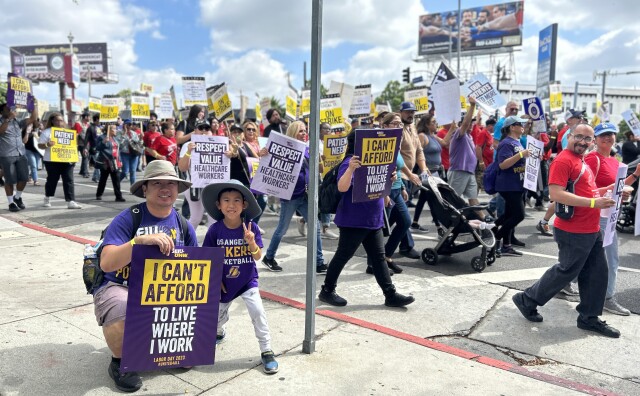This archival content was written, edited, and published prior to LAist's acquisition by its current owner, Southern California Public Radio ("SCPR"). Content, such as language choice and subject matter, in archival articles therefore may not align with SCPR's current editorial standards. To learn more about those standards and why we make this distinction, please click here.
It's Harder To Find A Bathroom On Skid Row Than In A Syrian Refugee Camp, Says Study
There's a major shortage of available bathrooms on Skid Row. A recent study says that access is so low that it's akin to availability in a Syrian refugee camp, reports the L.A. Times.
The report—titled "No Place to Go"—is part of a bathroom audit conducted on Skid Row by a collaboration between organizations that include the Los Angeles Central Providers Collaborative, Los Angeles Mission, Midnight Mission, Downtown Women’s Center, among others. The report found that only nine public toilets were open at night for the approximately 1,800 homeless on Skid Row. Study authors noted that this falls woefully short of the standards that the United Nations High Commissioner for Refugees set for refugee camps, including a Syrian refugee camp located in Jordan. According to the Syrian Network for Human Rights, there is one toilet for every 100 people at the camp in Zaatari, Jordan (which bests the ratio that “No Place to Go" found for Skid Row at night).
The Guardian says that the report notes that more bathrooms are available during the day (there may be as many as 43 available toilets), but the study authors stress that this is still well below UN standards. The report continues that some of the available bathrooms are inaccessible for people with disabilities.
“The lack of basic amenities like public toilets has gone on for so long that in skid row, the absurd has become the normal,” the report said, according to the Times.
Many of the bathrooms that are available have faced criticism. The four green, self-cleaning toilets provided by the city (there's one at 5th and Los Angeles streets, for instance) have been criticized for being unreliable and too costly to build and maintain (according to NBC 4, these units cost $250,000 each).
"They're expensive, and at least half of them don't work. And often times there'll be someone sleeping in there," Donna Dawson, program assistant at the Weingart Center for the Homeless, told LAist.
Wendell Blassingame, a representative of Skid Row on the Downtown LA Neighborhood Council, told KPCC that people get stuck in the bathrooms on occasion, as the automated doors fail to open.
In 2013, the Los Angeles County Department of Public Health conducted a survey that found that most of these units were out of order. "What is most critical in the … survey findings is the continuing lack of access to fully operable and sanitary public restrooms for homeless residents in the skid row area," the department report said.
Dawson says she'd like to see an availability of portable toilets, referring to the dozens of portable toilets that used to be available on Skid Row. As reported in an earlier Times article, former Mayor Richard Riordan had placed two dozen portable toilets on Skid Row in the '90s. Half of them were taken away in 1998, but returned after locals had protested the move. In 2006, the city removed all of portable toilets from the streets.
Alex Comisar, press secretary for Mayor Eric Garcetti's office, told LAist in an email that the mayor had earmarked $1.3 million in the 2017-18 budget "to expand access to bathrooms and personal hygiene facilities, including mobile showers" for Skid Row.
"Everyone should be able to bathe or use the restroom safely and with dignity, and anyone who walks the streets of Skid Row knows that we need infrastructure that meets the needs of our unsheltered population," wrote Comisar.
-
The project will rename most of the terminals and all of the gates with the goal of world-class signage that leans into psychology.
-
After San Gabriel's city council rejected the proposal as "too narrow", one city councilmember argued the entire DEI commission, created in the aftermath of George Floyd's murder, had "run its course."
-
A medical industry challenge to a $25 minimum wage ordinance in one Southern California city suggests health workers statewide could face layoffs and reductions in hours and benefits under a state law set to begin phasing in in June. Some experts are skeptical, however, that it will have such effects.
-
Sandhill cranes are returning to the Lake Tahoe basin after a century long hiatus in what many say is a conservation success story.
-
The Dodgers fired Mizuhara in March after Ohtani's lawyers accused him of stealing millions of dollars from the baseball player to place bets with an Orange County-based bookie.
-
Jackie’s partner, Shadow, refuses to abandon their unviable eggs, despite her attempts to nudge him along.






